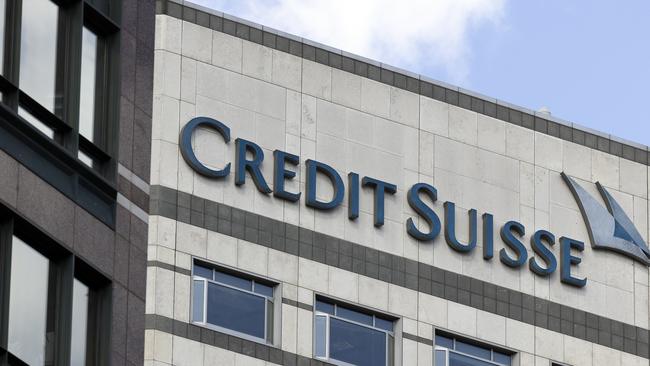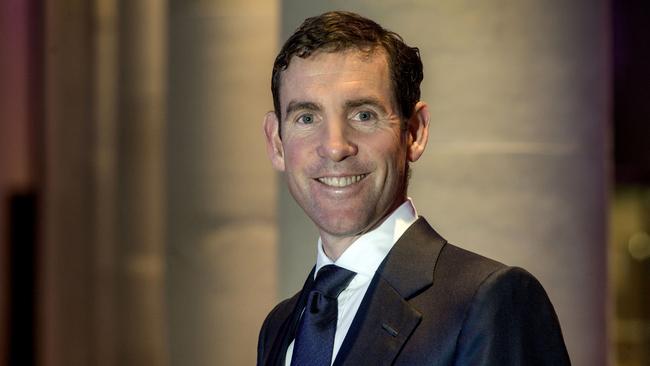Credit Suisse takes $US4.7bn hit on Archegos meltdown
The Swiss bank slashes dividend and its investment banking and risk chiefs will leave in the wake of crises at Archegos and Greensill.

Credit Suisse Group reported a $US4.7 billion hit from the meltdown of Archegos Capital Management, slashed its dividend and said its investment banking and risk chiefs would leave the bank.
The Swiss lender has been the hardest hit by the collapse late last month of Archegos, a US family investment firm, suffering a major loss in its unit that services hedge funds. The Archegos crisis emerged just weeks after Greensill Capital, a UK finance firm that was deeply entangled with Credit Suisse, filed for insolvency and left the bank on the hook for losses.
Chief executive Thomas Gottstein will stay in his job, but chief risk officer Lara Warner is leaving the bank and head of investment banking Brian Chin will depart at the end of April.
The double blow of Archegos and Greensill represents the bank’s biggest test in years and comes at a time of leadership transition. Mr Gottstein took over a year ago after his predecessor, Tidjane Thiam, was forced out after the bank was caught spying on a recently departed executive.
Later this month, the bank’s longtime chairman, Urs Rohner, is set to retire. He will be replaced with an outsider, Lloyds Banking Group chief executive António Horta-Osório.
Credit Suisse has struggled through a series of mishaps in recent years, causing surprise one-off charges that have dented its earnings and undermined its reputation as a safe place for the world’s rich to store their wealth. Mr Gottstein has promised to run a tighter ship and avoid surprises.
“The one-two punch of Greensill and Archegos shreds any illusion that its rolling reputational crises are excusable anomalies,” said Nir Kossovsky, chief executive of Steel City Re, which helps companies manage reputational risk with advisory services and insurance.
“The issue almost always boils down to siloed knowledge, authority and accountability, and not having a cross organisational intelligence gathering and analysis around reputational risk,” Mr Kossovsky said.
To shore up capital, Credit Suisse said it would suspend a share buyback program and pay a reduced dividend through a mix of capital and retained earnings. Mr Gottstein and the rest of the executive board won’t receive any 2020 bonuses. Mr Rohner is giving up part of his pay.
Credit Suisse shares have fallen by nearly a quarter since the beginning of March, but edged slightly higher Tuesday.
While the hole created by the Archegos crisis is substantial, an otherwise strong performance at the bank in the first quarter offset some of the damage. The bank said it expects a pretax loss in the quarter ended March of 900 million Swiss francs, equivalent to about $US960 million.
Credit Suisse said its dealings with both Archegos and Greensill need “substantial further review and scrutiny.” It said its board formed a crisis team and hired outside help to investigate.
The crises have triggered a fundamental re-evaluation among board members and Mr. Gottstein about how the bank should operate. The outcome of the investigations could prompt the bank to alter its mix between its more reliable wealth management franchise and still-volatile investment bank.
The investigations will also examine how the bank, after pouring huge amounts of investment into risk controls and oversight in recent years, allowed itself to get deeply involved in both situations. In the case of Greensill, the bank reviewed the relationship multiple times in recent years but continued to expand its business with the company.

Credit Suisse suspended its Greensill funds March 1, after credit insurance that Greensill was in charge of arranging ran out. The insurance made the funds safer and let Credit Suisse market them as an alternative to money-market funds, even though many of the underlying investments were sub-investment grade.
It demoted Eric Varvel, the head of the asset management unit that ran the funds, in March and named a new head to the division.
Part of the recent decline in Credit Suisse’s share price has been linked to worries that the bank will have to at least partially compensate investors in the Greensill funds. The funds could take years to claw back money from insurers and the underlying Greensill borrowers. Preliminary estimates inside the bank peg the fund losses up to $US1.5 billion, according to a person familiar with the matter.
Three weeks after the Greensill crisis, more bad news for the Swiss lender emerged. Credit Suisse was one of at least six banks that had to unload large stock positions when Archegos imploded. The New York-based family office had built up stakes in individual stocks with heavy borrowing from banks. Archegos couldn’t keep the positions going when one of the stocks fell sharply.
Credit Suisse was one of the last banks to exit, The Wall Street Journal reported. Some analysts had estimated it would lose between $US3 billion and $US4 billion from the fire sale.
Christian Meissner, a Bank of America Corp. and Goldman Sachs Group Inc. veteran, will become head of the investment bank, Credit Suisse said Tuesday. The bank hired Mr. Meissner last year to lead a new unit connecting its wealthiest clients to its investment bank. It put its former chief risk officer, Joachim Oechslin, temporarily back in that job and named a temporary head of compliance.
The bank’s head of equities sales, Paul Galietto, a key contact on the Archegos account, will also leave the bank this month, according to a memo reviewed by the Journal.
Thomas Hallett, an analyst at Keefe, Bruyette & Woods Europe, said the longer-term implications for Credit Suisse could include a much shorter leash from regulators, who might curb the bank from entering new business lines or restrict its dividends and share buybacks. There is also the risk, he said, that clients “potentially take business elsewhere.”
Last week, S&P Global Ratings, Moody’s Investors Service and Fitch Ratings all moved to a negative outlook on the bank’s ratings.
“Although clarity has been provided around the size of hedge fund losses, the debate around the high-risk, concentrated strategy at Credit Suisse has only just got started,” Mr. Hallett said.
Wall Street Journal



To join the conversation, please log in. Don't have an account? Register
Join the conversation, you are commenting as Logout